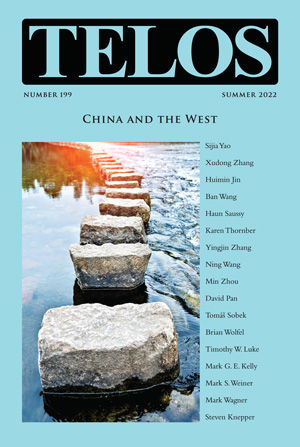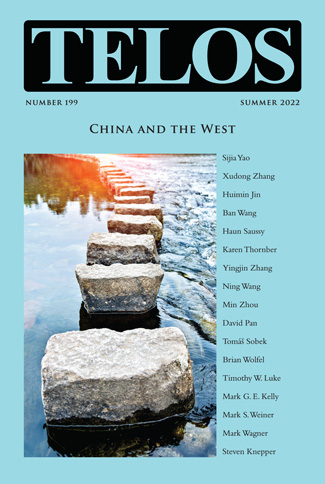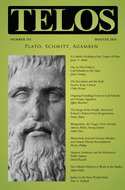 If we are seeing a rise in political violence today, is the main cause a decline in tolerance? On today’s episode of the Telos Press Podcast, I discuss the concept of tolerance with Tomáš Sobek, whose essay on the subject appeared in Telos 199. He argues that tolerance cannot be equated with liberalism, or rather that there are two ways of understanding the meaning of liberalism. While a positive form of liberalism contains a set of values that today would include support for abortion rights and gay marriage, a negative form of Liberalism (let’s call it Liberalism with a capital L) is limited to tolerating viewpoints or practices that one does not agree with. From this perspective, Liberal tolerance would include a conservative opposed to abortion who is willing to tolerate its practice. On the other hand, liberal (with a small l) tolerance would not include tolerating gay marriage, which the liberal in any case supports, meaning there is nothing to tolerate. Since one only tolerates something with which one is in disagreement, liberal tolerance would have to include something like tolerance of racism, even though one opposes it. Of course, it may be that some things are not to be tolerated, for instance murder, and some anti-abortion advocates would classify abortion as a form of murder and therefore intolerable, and liberal anti-racists might similarly classify racist prejudice as intolerable, to the point of advocating violence to oppose it.
If we are seeing a rise in political violence today, is the main cause a decline in tolerance? On today’s episode of the Telos Press Podcast, I discuss the concept of tolerance with Tomáš Sobek, whose essay on the subject appeared in Telos 199. He argues that tolerance cannot be equated with liberalism, or rather that there are two ways of understanding the meaning of liberalism. While a positive form of liberalism contains a set of values that today would include support for abortion rights and gay marriage, a negative form of Liberalism (let’s call it Liberalism with a capital L) is limited to tolerating viewpoints or practices that one does not agree with. From this perspective, Liberal tolerance would include a conservative opposed to abortion who is willing to tolerate its practice. On the other hand, liberal (with a small l) tolerance would not include tolerating gay marriage, which the liberal in any case supports, meaning there is nothing to tolerate. Since one only tolerates something with which one is in disagreement, liberal tolerance would have to include something like tolerance of racism, even though one opposes it. Of course, it may be that some things are not to be tolerated, for instance murder, and some anti-abortion advocates would classify abortion as a form of murder and therefore intolerable, and liberal anti-racists might similarly classify racist prejudice as intolerable, to the point of advocating violence to oppose it.
|
In today’s episode of the Telos Press Podcast, David Pan talks with Tomáš Sobek about his article “Tolerance as Suppressed Disapproval,” from Telos 199 (Summer 2022). An excerpt of the article appears here. In their conversation they discuss the difference between a moral norm and tolerance as well as the consequences of this difference for understanding tolerance; tolerance as a second-order attitude that involves a suppression of disapproval; how excessive tolerance can be wrong; the difference between positive and negative liberalism; and whether negative liberalism is opposed to or destructive of moral norms. If your university has an online subscription to Telos, you can read the full article at the Telos Online website. For non-subscribers, learn how your university can begin a subscription to Telos at our library recommendation page. Print copies of Telos 199 are available for purchase in our online store. Telos 199 (Summer 2022): China and the West is now available for purchase in our store. Individual subscriptions to Telos are also available in both print and online formats.
It would be a mistake, though, to see China and the West as polar opposites or competing civilizations, separated by their opposing political interests on the one hand and by the history of each of their cultural traditions on the other hand. Even if they had separate long histories, the recent past has seen many more opportunities for interaction and orientation around common projects and problems. Moreover, since the past is always a projection from out of the present, the idea of a clash of civilizations is not a legacy but a project. An alternative endeavor would be to conceive of the relationship between China and the West as existing within a larger totality. The definition of such a totality must occur within a particular perspective, however, and therein lies the problem. China and the West are clearly competing to define the framework of global order. Consequently, any attempt to consider the relationship between the two must look to the vision of universality that each side is trying to establish against the other. This issue of Telos considers a variety of ways of defining the overarching perspective from which the comparison between China and the West makes sense. Peter A. Redpath’s “Justice in the New World Order: Reduction of Justice to Tolerance in the New Totalitarian World State” appears in Telos 157 (Winter 2011). Read the full version online at the TELOS Online website, or purchase a print copy of the issue here. |
||||
|
Telos Press Publishing · PO Box 811 · Candor, NY 13743 · Phone: 212-228-6479 Privacy Policy · Data Protection Copyright © 2024 Telos Press Publishing · All Rights Reserved |
||||

 This article’s general thesis is that, shortly after World War II, some leading Western intellectuals started to work to build a new world order based upon a modified understanding of national sovereignty and a notion of justice that rejected Machiavellianism. It claims that during the 1960s, this project became hijacked by Western socialists and was turned toward undermining the authority of national constitutions and legal traditions and promoting Machiavellianism on a global scale. Socialists effected this transformation by wedding Nietzsche’s Machiavellianism to Rousseau’s teaching about morality. From Rousseau they adopted the notion of “tolerance”—having the right feelings and right way of reading history about an exploited, sinless, innocent class (the proletariat under communism)—to replace the classical notion of justice as a moral, behavioral, quality (habitually behaving rightly toward other people) in human affairs. Of crucial significance is that, in the process, they changed the West’s understanding of justice from a classical moral category related to behaving rightly toward others into a hermeneutical category of having the right political reading of history.
This article’s general thesis is that, shortly after World War II, some leading Western intellectuals started to work to build a new world order based upon a modified understanding of national sovereignty and a notion of justice that rejected Machiavellianism. It claims that during the 1960s, this project became hijacked by Western socialists and was turned toward undermining the authority of national constitutions and legal traditions and promoting Machiavellianism on a global scale. Socialists effected this transformation by wedding Nietzsche’s Machiavellianism to Rousseau’s teaching about morality. From Rousseau they adopted the notion of “tolerance”—having the right feelings and right way of reading history about an exploited, sinless, innocent class (the proletariat under communism)—to replace the classical notion of justice as a moral, behavioral, quality (habitually behaving rightly toward other people) in human affairs. Of crucial significance is that, in the process, they changed the West’s understanding of justice from a classical moral category related to behaving rightly toward others into a hermeneutical category of having the right political reading of history. 






